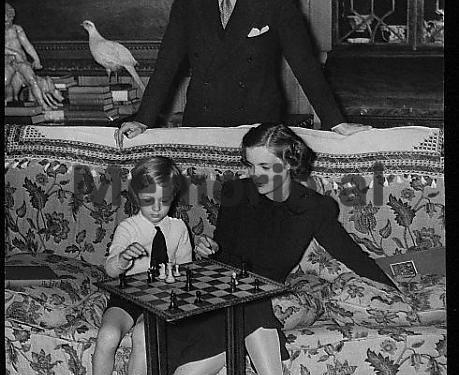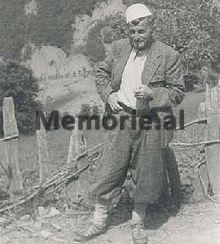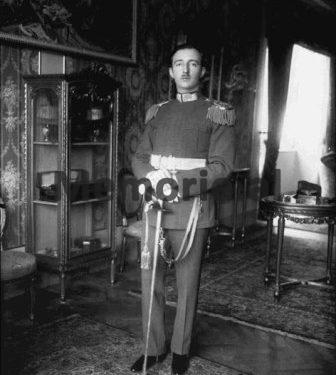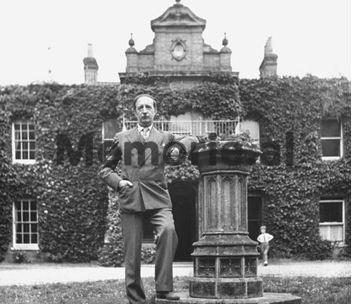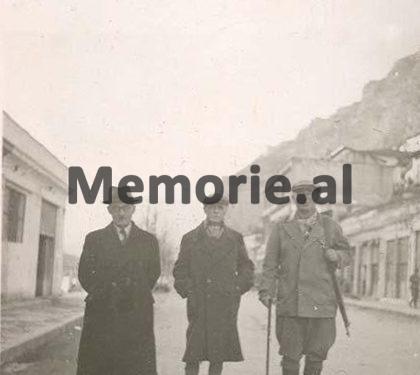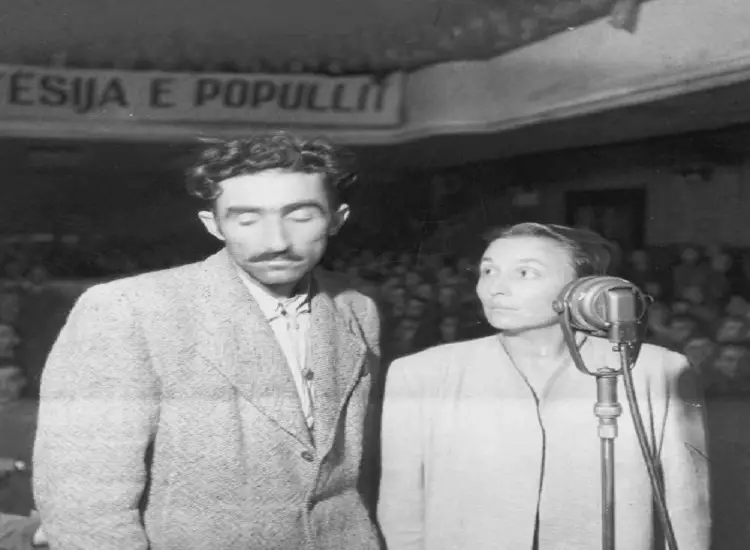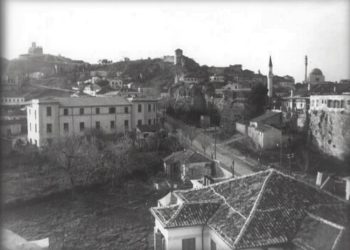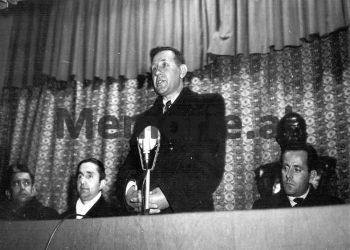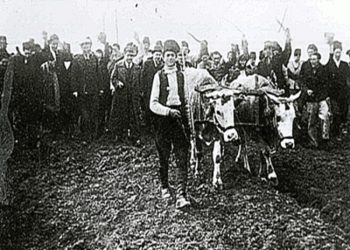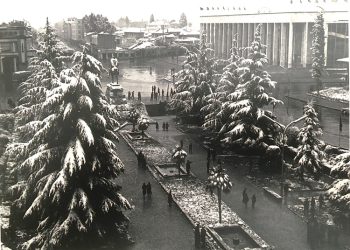Dashnor Kaloçi
Memorie.al publishes the unknown story of King Zog’s correspondence with the former Prime Minister of Albania, Mehdi bey Frashëri, in January 1960 when Zog was in Cana, France and decided to write his memoirs, where he wanted to reflect some from the most important events in the history of Albania, such as: the Corfu Protocol in 1914, the actions of the International Commission of the League of Nations in southern Albania, the actions of the International Commission on Border Control, the assassination of General Telini, etc. After describing the six main points for which he sought detailed explanations as much as possible, King Zog closes his letter, reminding former Prime Minister Frashëri of the great services he had rendered to Albania. While Mehdi bey, after expressing his readiness to King Zog, to help him with all the matters he was aware of, at the end of his letter, wrote: “I still think that Albania, isolated from Russia, “There is no way I cannot find sooner or later a favorable international political conjuncture, to allow the Albanians to cast this yoke, which, from all I have seen, is certainly the most terrible.”
“I started preparing the memoirs, of course I have notes, but I could not like it: An Authority that has happened in what matters inside, to give me as many explanations as possible. So, if you will be able to give me the details on these points that I am listing below… These have the ability to write to me in a way that you could wish that a personality who has given Albanian excellent services “.
This is written, among other things, in one of the unknown letters of King Zog, dated January 20, 1960, when he spent the last months of his life in the city of Cannes, France, which is addressed to Mehdi bey Frashëri, former -The Prime Minister of Albania of several government cabinets in the years of the Zog Monarchy, who at that time lived as a political asylum seeker in the Italian capital, Rome. What is further written in that letter of King Zog and what does he ask from the former Prime Minister of Albania? All this is mentioned in a series of original letters and documents that are part of the complete correspondence between them, which have been preserved with fanaticism and great care in the family archive of Mehdi bey Frashëri in Rome.
Given the importance of those documents (which are not in the archives of the Albanian state), which talks about some of the most discussed and talked about events in the history of Albania, such as: Corfu Protocol in 1914, Actions of the International Commission of the League of Nations in Southern Albania, the actions of the International Commission for the delimitation of Albania, the assassination of General Telini, the quarrels over St. Naum and Vermosh, etc., thanks to the kindness of Mehdi Bey’s nephew, Mr. Tefik Çelo, (the girl’s son, passed away a few years ago in Tirana), who made them available to us, a part of them Memorie.al is publishing them in full in this article, without making any changes from linguistic side.
The bird writes to Mehdi bey
Dear Mehdi Bey, I hope that you, Nyre Hanmi, and the whole Family are in good health, but we are all well. I started preparing the memoirs, of course, I have notes, but I could not like it; an Authority qi has happened in what matters within, to give me as many explanations as possible. So ‘n’ is that you will have the opportunity to give me as much detail on these points qi I am listing below:
1-Actions of the International Commission in Corfu in 1914.
2- On the Data of Himara.
3- Actions of the League of Nations Commission in Southern Albania.
4- Actions of the Border Delimitation Commission.
5- The assassination of General Telin.
6- The quarrels, and the execution of St. Naum, and Vermosh.
You have the ability to write to me in such a way that you could wish that a personality who has given Albanian excellent services.
I wish you, Nyre Hanmi, the whole family good health.
Canne-20 January 1960
Mehdi bey Frashëri’s answer to King Zog
Great, I’m glad that M.J. and family you are in good health, we unfortunately still have Neyren sick, although she has made some improvements. Mediha and the boys do their best to make her life easier and to find a way to cure her. This is the only consolation of my old age in exile. I learn with great pleasure that M.J. you started writing memories. I am convinced that these are necessary for the history of Albania; will direct many of the mistakes of the last 40 years. Here you will find the answers to the questions that M. J. addresses me. I hope you are of a utility. Anyway, I am here, every time the need arises, give me what you know, in this exceptionally important work that M. J. you started. In issue five, I have summarized General Tellin’s assassination in the actions of the Delimitations Commission, so my findings contain only 5 issues. To you, M.J., I hear the need to take a brief look at the situation. I still think that Albania, isolated from Russia, has no choice but to find sooner or later a favorable international political conjuncture, to allow the Albanians to cast this yoke, which, from all I have seen, is certainly the most terrible. I remain with my deepest respect for M. and J. and the whole royal family, in which the whole family is associated.
Mehdi Frashëri
31 January 1960, Rome
King Zog’s interest in the ‘Corfu Protocol’
One of the issues that King Zog asked former Prime Minister Mehdi bey Frashëri to clarify, was the one that referred to the “Actions of the International Commission in Corfu, in 1914”, or as it is otherwise known in the history of Albania, as the Protocol of Corfu”. Regarding this point, among other things in his letter, Mehdi Frashëri explains: “At the London Conference in 1913, since it was decided that Korça and Gjirokastra should remain to Albania, Greece could not openly attack these two prefectures, which he called Northern Epirus. She therefore sought to indirectly find a reason to make these countries autonomous first, and later to annex them in a second phase.
To this end, the Greek governor of Ioannina thought that while the Greek troops were there, he would push the Orthodox Christians of that province in the form of an insurgent gendarmerie, so that when the Greek troops withdrew, the gendarmerie would take its place. to fight with the Albanian gendarmerie if she went there. This Greek-minded rebel force needed a government to call itself Epirote. Thus, a person named, Gjergj Zografi, son of Kristaq efendi, from Lunxhëria of Gjirokastra, with his brother-in-law Karapanon, and a Greek officer of Albanian origin named Dhulis, formed an autonomous government of Northern Epirus.
At this time, the Muslim population of these two Albanian prefectures started a war against the Epiriot gendarmerie. Due to the fact that the power of the Albanian gendarmerie was insufficient and the Muslim population was not organized, the Epirote gendarmerie began to burn the Muslim villages, to force that population to leave the country and only the Orthodox remained there. For this event, the government of Prince Wid, headed by Turhan Pasha, was forced to address the International Commission consisting of delegates of the six major powers, which included: Great Britain, France, Italy, Germany, Austria and Russia. Mehdi Frashëri was appointed as a delegate by Albania to cooperate with this commission.
At this time, in central Albania, the fanatical Muslim part, started a movement in favor of Turkey, saying: “We want Baba Dovlet”. Given this, the Government of Prince Wid remained in a very difficult position, as Muslim fanatics sought in the place of Prince Wid, a prince from Turkey. After this the Commission of International Control informed Zografo that he would come to Corfu and talk to the Epirote government. At the Corfu meeting, the Albanian delegate was not supported by any of the great powers in order to force the Control Commission to take decisions in the interest of Albania.
As a result, the International Commission decided that the prefectures of Korça and Gjirokastra should form an autonomous government under the jurisdiction of the Albanian government, where the gendarmerie officers of Epirus Autonomous would be composed of Greek officers since the local Albanian Orthodox, at the time of Turkey, had no officers. The orthodox church of the country would be led by the Greek clergy appointed by the Patriarchate of Istanbul. The language of instruction in special orthodox schools would be Greek. As can be seen, all these measures foresaw the Greekization of a large part of southern Albania. The decisions of the Corfu Conference were then submitted to the Conference of Ambassadors in Paris for approval.
By this time the Epirote government of Zografos had made a pact with the fanatical Muslims of Central Albania, which forced Prince Wid to leave Albania. At this time the Epiriots broke the armistice that had been concluded between the Albanian power and them, and the place of the Epirus government of Zografos, as predicted, was taken by Greece. These events coincided with the start of the First World War. At this time, Italy, since it had territorial claims (claims) against Austria, in order to later enter the war, occupied Vlora and with the allied forces signed a secret treaty which stated: Vlora with a part of the provinces around it would be directly in the administration of Italy and Central (Muslim) Albania under its protectorate.
As for Shkodra in the North and Korça and Gjirokastra in the South, it would not make any objections, if the Conference would give Shkodra to Serbia and Korça and Gjirokastra to Greece. After World War I lasted several years and the United States went to war against the Austro-Germans and in favor of the Allies, President Wilson declared that he did not recognize the secret treaties. In this context, he called Italy’s secret treaty with the allies, in the Peace Conference, worthless, but nevertheless, in the treaties of the Conference in question, he proposed that Vlora be left to Italy and the south side of the river. Vjosa should be given to Greece. As for the remaining part, an area between the Vjosa and Lake Maliq, a referendum would be held and its conclusion would be a test of who would be left with that area, Albania or Greece.
Since the majority in this area were Muslims and among the Orthodox there were also Albanian nationalists, there was great hope that it would remain in Albania. As for Shkodra, it was not mentioned because it was simply Albanian. Following the war, the Allies saw the need to land an army in Thessaloniki to attack Austro-German forces, using the remnants of the 150,000-strong Serbian army, which in Corfu, the Allies had reorganized and best armed. The Allies also proposed to Greece that it enter the war in their favor, but King Constantine was the son-in-law of Kaiser, (King of Germany), and besides Venizelos, a large Greek party did not want to go to war, only if they gave Istanbul. This was a job that was not done, as it coincided with Russia’s intentions.
At this time, the French began to suspect that Greece was in favor of the Austro-Germans, and to stop contact between Greece and the Austro-Germans, mediated by the patriotic nationalist Themistokli Gërmenji, General Sarail, commander of the allied armies in Thessaloniki, I also sent a battalion of soldiers to Korça. This force expelled the Greek army and formed the government of Korça, Autonomous Albanian, with Themistokli Gërmenji. After that she organized two Albanian gendarmerie battalions. At this time the French forces were stationed as far as the village of Selenica in Cologne. While the territory from Selenica to Saranda was occupied by the Italian army. Thus, neither the army nor the Greek government remained in Korça and Gjirokastra. “As a result of these events, it became possible for the French to strongly oppose Korça and Gjirokastra at the Peace Conference, and the decisions of Corfu were not taken into account, as Greece itself had violated the ceasefire.”
Zogu demands clarifications on the Himara issue
Two of the other points that King Zog asked Mehdi Frashëri for clarifications, were: “Dhenomet (Privileges) of Himara” and “Actions of the League of Nations Commission in Southern Albania”, issues which to this day continue to create problems. Regarding these, former Prime Minister Frashëri in his response to Zogu, writes: “The privileges of Himara are the same as those of Korça and Gjirokastra, with the difference that at that time, a person named, Spiro Milo, from Himara, had put a large cross on his chest and had accompanied Zografos. Spiro Milo asked for a flag of Himara, which did not matter, so it was accepted by the International Border Control Commission.
Also at that time, given the fact that the Greeks always complained that the rights of Greek minorities were violated in Albania, the League of Nations decided to send to Albania a special commission consisting of: Professor Siderholm (Finnish), Comte de Pourtales (French ), and a Norwegian officer. This commission moved all over Albania, both in the North and in the South, and in the end, I found that the Greek minority was only in the province of Dropull in Gjirokastra and in the Vurgun of Delvina, which were of no importance. As for the prefecture of Korça, they found that there was not a single Greek. In conclusion, the commission found that the Greeks also called the Orthodox Albanians Greeks. So, as you can see, this commission in its report shows the truth as you are “. This is how Mehdi Frashëri concludes his explanation regarding the claims of the Greeks for their minorities in Southern Albania.
Mehdi bey: “General Telini was killed by the Greeks”
One of the last points that King Zog asks Mehdi Frashëri to clarify is that of the assassination of the Italian general, Telini, who headed the International Commission of Border Control. Regarding this event, in his response, Mehdi Frashëri wrote: “The Border Control Commission had started its work before the First World War, but with the beginning of that war that work was stopped and left for later. After the end of the war, a second commission was formed again consisting of: the Italian general, Telini, the British colonel, Jails, and the French colonel, Ordillion. While the Albanian government initially appointed Hil Mosi, but since he resigned, Dhimitër Berati was appointed in his place.
After that, General Telini and Dhimitër Berati went to Ioannina to get in touch with the Greek military authorities, in order to complete the commission with the Greek delegate. Colonel Bocari was appointed as the Greek delegate, who was a Greek extremist and great-grandson of the famous sultan, Marko Bocari. Since Colonel Bocari considered General Telini a supporter of Albania, he decided to kill him. To kill Telini, he collaborated with a fugitive Greek criminal named Rexhei. After that, the gang led by Rexhei ambushed and killed General Teleni, while he was returning to Albania with his orthodox translator.
To remove the political responsibility, the Greek Government blamed this murder on the Albanians, and as after their version, it happened due to the fact that the Italian general had taken part in the Vlora War. But this version of them was nothing but a big lie and slander. After that, the Italian government, from the report it had received from Telini, understood that the Greek authorities had in every way turned against the general, so Mussolini sent a fleet to Corfu and gave the Greek government an ultimatum, in this sense: “The Greek government in corpore will to go to the Italian fleet in Piraeus and apologize for the assassination of General Tellini, I also ask for 50 million francs as compensation for the people we killed. After this event, General Gazzera for Italy was appointed as the Italian delegate instead of General Tellini, and Mehdi Frashëri from Albania was appointed as the Delimitation Commissioner.
The unknown letter of the Minister of the Court, Hysen Selmani to the Frashëri family: “I am confident that you will write the story well”
Among the many letters that make up the correspondence of former Prime Minister Mehdi bey Frashëri and his family with King Zog’s family, there is also a letter from 1971, where the Minister of the Royal Court, Colonel Hysen Selmani, from France sends it to him. Ragip bey Frashëri, the eldest son of Mehdi bey, who lived in Rome. In that letter, he writes:
I love Ragip Bey very much,
Today, as soon as I returned from Paris, where we were with King Leka, at the Ceremony of the 10th Anniversary of the Death of the late King Zog, there were many Albanians from America, England, Belgium, Germany, Sweden, France, almost more than 1000 people where I pass very well, and the time was a summer, and today when we returned I found our letter dated 2 April 1971, we rejoiced exceedingly that you are all well, and we are well. Where do you ask me for the copy of the description of the late Mehdi Bey, I photocopied it and I am sending it completely, and we are very happy that you are publishing a historical book, of course you have enough documents that the late Mehdi Bey had, and you yourself are a good writer, and this work will undoubtedly be perfected.
The great ones of Tyne, Mehdihase, Vehbi, and you, wish you full health and send you the most cordial greetings. I do not talk about emigrating to the United States of America, as you have decided, they have learned that Ndue Gjon Markaj with all his children emigrated to America. With that I am stopping, Mehdihase, Vehbi, Tye, I wish you full health as much as your heart desires, and you are fed up with a lot of longing, the apple took us because we did not see you often, God bless us. / Memorie.al
Always yours, Hussein Selmani




